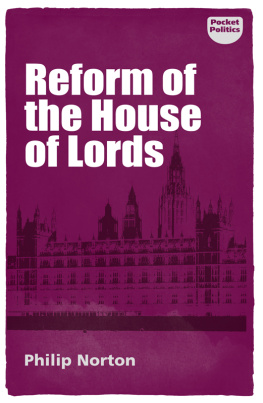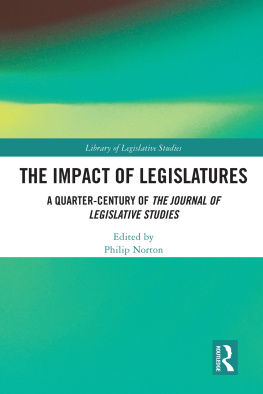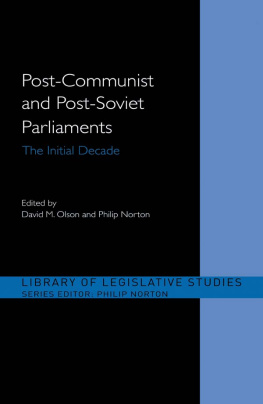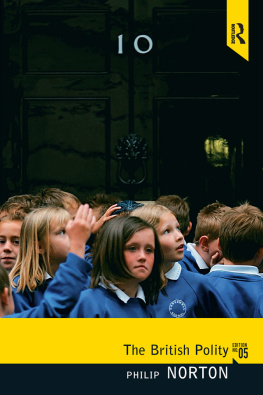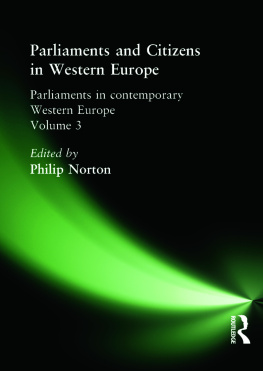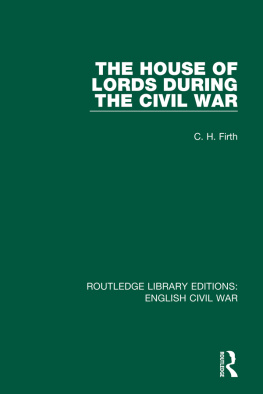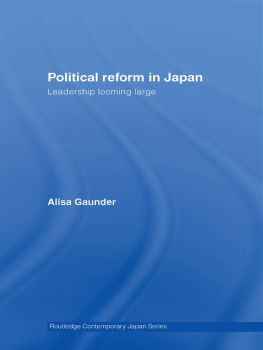Copyright Philip Norton 2017
The right of Philip Norton to be identified as the author of this work has been asserted by him in accordance with the Copyright, Designs and Patents Act 1988.
Published by Manchester University Press
Altrincham Street, Manchester M1 7JA
www.manchesteruniversitypress.co.uk
British Library Cataloguing-in-Publication Data
A catalogue record for this book is available from the British Library
ISBN978 1 5261 1923 0paperback
First published 2017
The publisher has no responsibility for the persistence or accuracy of URLs for any external or third-party internet websites referred to in this book, and does not guarantee that any content on such websites is, or will remain, accurate or appropriate.
Typeset
by Toppan Best-set Premedia Limited
1
Why the House of Lords matters
The United Kingdom has a parliamentary system of government. Government is not elected directly (as in a presidential system), but is chosen through parliamentary elections. A party achieving an absolute majority of seats in the House of Commons is invited to form the government. Political parties seeking to implement their preferred programme of public policy therefore fight to win seats. The chamber of the House of Commons is the arena in which the second-largest party forms an official Opposition and in which it, and other parties, question and challenge government. The chamber provides the Opposition with the opportunity to demonstrate that it is the alternative government, ready to replace the party opposite at the next election. The exchanges between the Prime Minister and the Leader of the Opposition at the weekly Prime Minister's Question Time act as a magnet for the television cameras.
Given the centrality of the House of Commons to political life in the United Kingdom, it is not unusual to see Parliament and the House of Commons treated as synonymous terms. Commentators will variously say Parliament today is debating when they mean The House of Commons today is debating . The focus on the House of Commons is not surprising, but masks the fact that the United Kingdom has a bicameral, that is a two-chamber, legislature. The House of Lords is the second chamber of Parliament.
: 30). However, the fact that it is not elected is important for shaping the contemporary relationship between the two chambers. By virtue of being the elected chamber, the House of Commons enjoys primacy. The fact that members of the House of Lords are not elected is core also to understanding the debate on reform of the House.
Until the early twentieth century, the two chambers were for most purposes co-equal, but the growth of a mass electorate established the supremacy of the elected chamber and the House of Lords lost its capacity to veto the wishes of the House of Commons. The first half of the twentieth century saw measures to limit the power of the House and the second half saw measures to change its composition. Although the nature of the membership of the House of Lords has changed substantially, it remains an unelected House. It is derided by critics as undemocratic and as a relic of a feudal era.
What, then, is the point of the House of Lords? The House of Lords matters: firstly, because Parliament matters, and secondly, because within Parliament it fulfils tasks which it sees as adding value to the political process. The House conceives its role as not to conflict with but, rather, to complement the work of the House of Commons. We address here what the House presently does and who fulfils the work, that is, the membership. How the House got to where it is we address in the next chapter and what should happen to it in later chapters.
Importance of Parliament
: 3940). The courts and law-enforcement agencies enforce Acts of Parliament. However popular a policy is, it cannot be enforced as law until approved by Parliament.
: 67). Often, the key consideration for government business managers is not whether they have the votes to pass a measure, but whether they have the time to get it through. The legislative process is based on the premise that government is entitled to get its business considered, but the Opposition has a right to be heard.
Functions of the House of Lords
). Its contribution is in terms of reflection: that is, deliberating, particularly but not exclusively, on what the first chamber has done. As a reflective chamber, its contribution can be divided into several functions. We treat its functions as consequences for the political system, in other words, what it actually does, rather than tasks formally ascribed to it.
The functions derive from the House's seeking to complement and not challenge the work of the elected chamber. The House seeks to add value to the political process, including by carrying out work that the Commons may not have the time, the political will, or the resources (such as time) to fulfil. The three most significant are legislative scrutiny, calling government to account, and debate. The three are not mutually exclusive, but they are analytically separable.
), but there are differences in terms of procedures and focus.
Legislative stages in each House
| First reading | Formal introduction. Title is read out. |
| Second reading | Debate on principle. |
| Committee | Consideration of amendments and approval of each clause, either in a committee away from the chamber (public bill committee in Commons; grand committee which any member can attend in the Lords) or in committee of the whole House. |
| Report | Bill returns to chamber, where further amendments, usually on issues not resolved in committee, are considered; proceedings are more formal and limited than at committee stage. |
| Third reading | Final approval of bill by the House. In the Commons, usually taken straight after report and often without debate; in the Lords, gap of at least three days after report stage and further amendments may be considered. |
| Commons/Lords amendments | Consideration by House in which bill originated of any amendments made by the other House. Both Houses have to agree for bill to proceed to Royal Assent. If there is disagreement, amendments may go back and forth between the two (ping pong) until agreement is reached. |
: 278). The purpose is to highlight the deficiencies of the bill and the alternative proposals of the Opposition.
In the House of Lords, the focus is the detail of the bill. By convention, the House does not seek to reject on second (or third) reading any measure promised in the government party's election manifesto, and in practice it does not usually vote on the second reading of any bill that forms part of the government's programme. It will debate the bill, but accepts that the elected chamber, the House of Commons, is entitled to get its way in terms of the ends of the bill. It therefore focuses on means rather than ends. Time is devoted to detailed scrutiny. This is facilitated by the fact that the House does not make use of programme motions. All provisions of a bill are therefore considered. Also, unlike in the Commons, all amendments that are tabled by peers are considered. (In the Commons, there is a selection by the Speaker in the House or the chair in committee of amendments to be debated.) The Lords also has an additional stage at which to consider amendments. Both Houses utilise committee and report stages for considering amendments. The Commons uses third reading (often taken formally) for the final approval of a bill: no amendments are considered. In the Lords, however, amendments can be, and variously are, taken at third reading to resolve issues not resolved at preceding stages.

